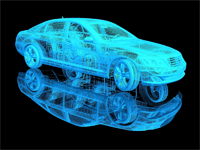
Legacy Systems a Challenge for Big Automakers
Ford Motor Company is making use of big data in many aspects of their operations, but legacy systems present a challenge as the company moves into the new era.
 So says, Dr. John Ginder, Manager of System Analytics and Environmental Sciences at Ford Motor Company in a recent interview.
So says, Dr. John Ginder, Manager of System Analytics and Environmental Sciences at Ford Motor Company in a recent interview.
“We’re a traditional industry – we’re over 100 years old now,” explains Dr. Ginder. “There are a lot of existing processes that we kind of have to shoehorn into. We have data centers that are running software that is 30-40 years old in some cases, so there are some legacy issues that can be a problem for us.” Dr. Ginder says, however, that with the rise of Hadoop, he sees some light at the end of the tunnel.
Ford is making good use of the data heaps that are under their purview, says Dr. Ginder. He explains that there are three key areas where Ford is getting value out of the big data phenomenon, including data from the plant floor manufacturing processes, the data that is generated on the vehicle, and data that exists on the web that connect them to their customer’s demands.
Dr. Ginder explains that “data mash-ups” is what he is most excited about as he considers big data. “I talk to my team all the time looking for those mash-ups, those correlations between these distinct data sources,” he expounds. “For example, wedding plant for data with warranty data – can we see some patterns early, can we detect problems earlier, and can we do prognostics or diagnostics to help our customers avoid problems.”
The biggest prospect for using big data moving into the future – “the holy grail,” says Dr. Ginder, is data from vehicles in the field. “We don’t want to invade anybody’s privacy – we are very sensitive about that. But we think using anonymized data, using opt-in, we can probably do a much better job redesigning experiences for our customers in optimizing the operations of the vehicle to get better fuel economy, or to better time their route, or lots of opportunities around that.
Some of Ford’s more advanced vehicles contain 40-50 different computer modules on board, explains Dr. Ginder, which provide data on everything from how the engine is operating, what the transmission is doing, to environmental measurements like barometric pressure, humidity, and temperature. “There is an estimate that about 25 gigabytes of data is produced every hour on some of our more advanced vehicles,” he says.
Dr. Ginder mentions that there is an internal thrust around finding better application for data that is “falling on the floor,” which he refers to as “data exhaust.” He says that this is data that the company is not using, but could potentially provide benefit. “We ask ourselves, can we do a better job with that.”
Related Items:
How Ford is Putting Hadoop Pedal to the Metal
Ford Looks to Hadoop, Innovative Analytics
Six Super-Scale Hadoop Deployments






























